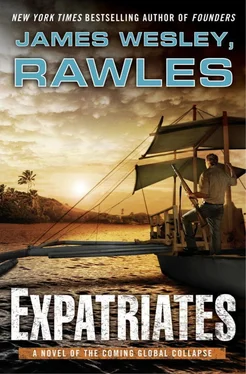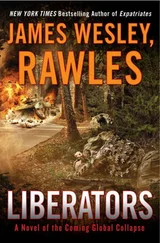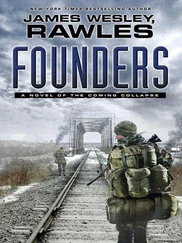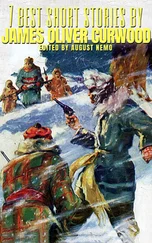Just as the Jeffords had begun to feel panicked about their situation, Joseph Navarro, a teenage Jeepney barker showed up at the school. Joseph’s job as a barker was to call out the routes and drum up customers. But his job also gave him free rides almost anywhere, and the opportunity to make some money on the side. He often sold used cell phones, cell phone SIM cards, and prepaid telephone calling cards. He regularly made deliveries to the mission school, which was on one of his routes. Joseph only casually knew the Jeffords, but he approached Peter and asked, “Kuya, I hear you want to get to Luzon. My grandfather, Paul Navarro, says he will take us in his outrigger boat—a carag boat called the Tiburon —if you can help buy the diesel fuel. It’s a big fishing boat.”
“Is it big enough to carry us and all of our luggage?” Peter asked.
“Oh, yeah. Ang Malaking barko —a big boat. I’ve been helping him run her since I was twelve.”
“He’d really be agreeable?”
“I think so,” Joseph replied. “We are really tight. I’m his Tuazon , you know, his youngest grandson.”
“It sounds like you are his favorite grandson, too.”
Joseph, who was modest, nodded and looked embarrassed when he heard that.
The Jeffords met Paul Timbancaya Navarro a few hours later. They learned that everyone called him Tatang (grandfather), even people who were not related. He had a strong reputation in the community, both as a fisherman and as an instructor of the Filipino Martial Arts (FMAs). Now in his early seventies, he had reduced both occupations to just part-time endeavors.
Paul Navarro was sitting on his porch reading an Abante tabloid when Joseph and the Jeffords arrived. He gazed up from his paper and said quietly, “I heard you need to get to Luzon.”
“That’s right,” Peter answered.
The old man set aside the newspaper and said, “This very familiar to me, from a long time ago. It is just like the Huk uprising, right after the World War Two. I was a little boy then. Our family originally lived on Luzon, but my dad decided to flee to Samar, in 1948. This was during the Huk Rebellion. Rumor had it that they were going to try to recruit my father by force, or that there was a price on his head. So he got wise and fled. He thought he would be safer if he moved our family completely off of Luzon. He chose to come here to Samar, where he already had a few relatives.”
Peter nodded. “That was a smart thing to do.”
“Yes, when there is trouble like that, with hundreds of soldiers coming your way, you don’t try and stand your ground. That will just get you killed. What you do is pull up anchor and get the heck out of there. That is what my dad did, and it saved all our lives, in my family. This is wisdom.”
From his history reading, Peter Jeffords knew that the Huk Rebellion had been a communist-led uprising of peasants, primarily on Luzon. The name of the movement was a Tagalog acronym for Hukbo ng Bayan Laban sa Hapon , which was often shortened to Hukbalahap , or simply just Huk . The acronym stood for “People’s Anti-Japanese Army,” which was how the communist rebels got their start. The Huks were eventually defeated by the army during the presidency of Ramon Magsaysay.
“Even after it was safe to return to Luzon, my father decided to stay on Samar. That worked out okay, too,” Tatang said.
After a long pause, Tatang Navarro said, “I will take you.”
Again and again, the Jeffords expressed their thanks. They wore huge smiles and felt tremendous relief in the knowledge that they would be escaping the ILF. They knew that Mr. Navarro’s generous offer had just saved them from almost certain death.
They went to see Tatang Navarro’s boat late that afternoon. Peter and Rhiannon liked the look of the boat. It was thirty-eight feet long with a five-foot wide hull, and a thirty-inch draught. For stability, it had traditional double-pole outriggers called carags . The boat had a graceful upswept triangular transom, but its well-proportioned bowstem was incongruously tipped with an old car tire that had been painted white for use as a mooring buffer. Overall, the boat had attractive lines, but it was obviously built more for utility than for style. What Tiburon lacked in chromed fittings, it made up for in solidity and native charm.
A pair of large white horizontal canvas awnings covered Tiburon in the rear and amidships. The awnings were elevated in shallow inverted Vs, suspended from short masts. They had reinforcing rods down the center and numerous guy lines to keep them taut. Unless the winds were unfavorable, the awnings could be left unfurled day and night.
Tacked up above the chart box were newspaper clippings—most of them about Filipino boxer Manny Pacquiao, a national hero and distant cousin of Navarro’s late wife—and a few faded printouts of digital pictures showing some of their particularly large catches of fish that had filled the hold.
Tiburon ’s engine was a Mitsubishi straight block four-cylinder, a naturally aspirated diesel with a 2,659 cc displacement. This reliable engine produced 80 horsepower. It was equipped with an auxiliary belt-drive alternator, which was used to charge a pair of 6-volt deep cycle marine batteries. The batteries were needed to operate an electric Power Block winch for hauling in the fishing nets. This was a smaller version of the big winches used on commercial purse seiners. The engine’s exhaust pipe, one of the few stainless steel fittings on the entire boat, emerged just below the center of the transom rail.
Their original plan was to motor Tiburon northward to Batangas in southern Luzon only 170 nautical miles—about a fourteen-hour trip at twelve knots. The next morning, however, word came that the ILF and Indonesians also planned to invade Luzon in their jihad campaign. Peter and Tatang began a series of meetings on the old man’s porch to discuss alternative destinations.
Unfortunately, most of the Pacific islands were not self-sufficient. If the Crunch lasted for another year, Peter anticipated that many Pacific islanders would be starving to death. Peter summed it up. “Continental land masses have resources that just aren’t available on island nations.”
They weighed the merits and drawbacks of different destinations. They even considered going as far as the United States, but the vast expanses of the central Pacific Ocean were more than they could handle. To motor their way 5,300 miles to Hawaii and then another 2,500 miles to San Diego seemed far too uncertain, and well beyond the capabilities of their coastal fishing boat. Rhiannon had also been hearing reports of a total collapse of law and order throughout the United States, with the worst of the chaos on the East and West coasts. Most of their news came from Radio Australia, which was still in operation. Most of the other international shortwave broadcasters had gone off the air. In the end, northern Australia seemed like their safest bet.
Tatang had always burned a mix of petroleum–based “dino diesel” and various plant-derived oils in Tiburon ’s engine. He was proud to exclaim, “This engine, she’s an omnivore. She can burn coconut oil, palm oil, peanut oil, corn oil, you name it!”
To surreptitiously get to Australia through Indonesian-controlled waters, Peter realized that FV Tiburon was actually better suited than the larger and ostensibly more seaworthy steel boats docked in Samar’s harbors. Because Paul Navarro’s boat was constructed of wood, it was radar transparent. The only significant radar reflector was the engine block, and most of that was below the waterline and therefore less visible to radar. Even the ship’s wheel was made of wood. As was typical of locally made boats, oversize wood mooring bitts were used instead of the stainless steel ones used on nearly every boat from First World countries. And since Tiburon was built in the late 1990s, its two diesel fuel tanks—forty and forty-five gallons—were made of HDPE plastic rather than steel.
Читать дальше












